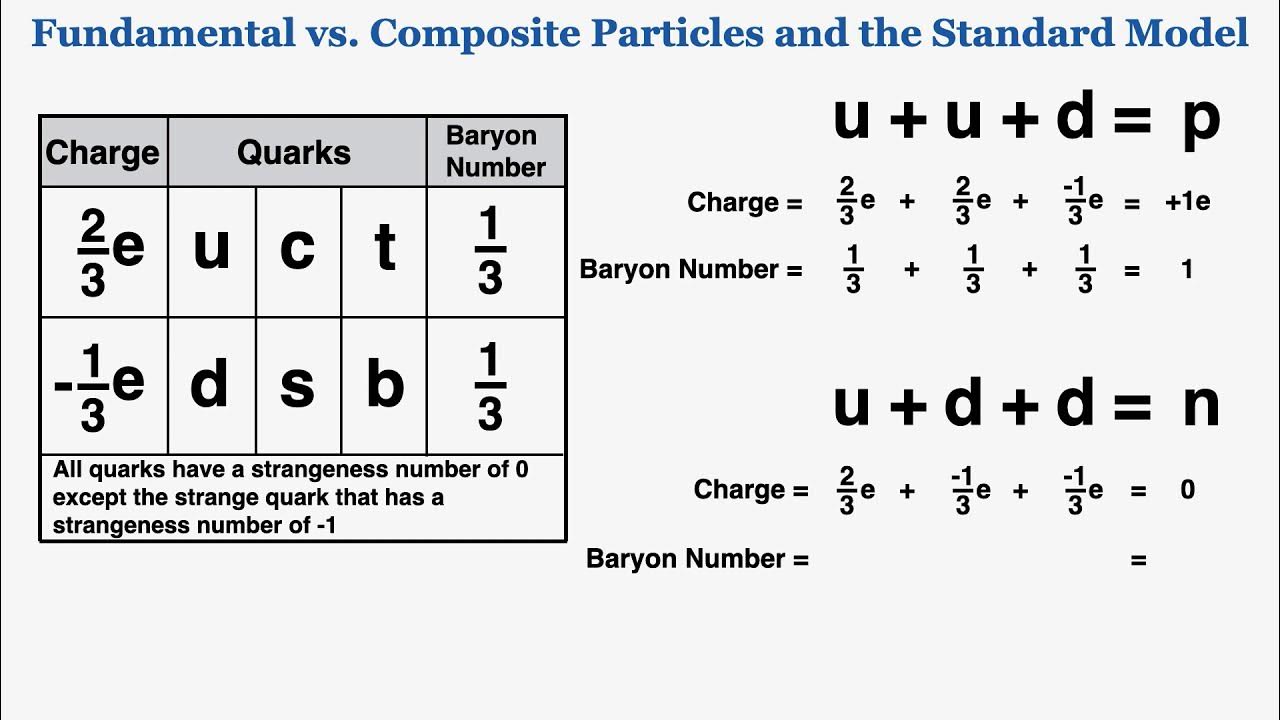Do humans have souls? | Physicist Sabine Hossenfelder
TLDRThe video script explores the concept that everything, including human beings, is composed of elementary particles as described by the standard model of particle physics. It addresses the philosophical question of whether there is more to us than just fundamental particles, touching on consciousness and the soul. The speaker argues that our experiences and thoughts can be explained by particle physics and that the complexity of our existence is due to the arrangement and interaction of these particles. The idea of 'emergence' is introduced, suggesting that higher-level properties and collective behaviors of particles can be reduced to their fundamental properties. The speaker also posits the possibility of uploading one's identity and body to a computer, emphasizing the hopeful message that our essence lies in the information contained within the configuration of our particles.
Takeaways
- 🌌 Humans and everything in the universe are composed of elementary particles according to the Standard Model of particle physics.
- 🤔 Many people question if there is more to their existence than just fundamental particles, such as consciousness or a soul.
- 🧠 The speaker believes that our experiences and thoughts can be explained by particle physics and does not require additional concepts like the soul.
- 📚 The understanding of consciousness is better left to neurobiologists and related fields, without needing to alter the fundamental laws of physics.
- 🔍 Dualism suggests the existence of a non-physical soul separate from the physical body, but it must not interact with the physical realm to remain consistent with physics.
- 🌐 Everything not in the Standard Model, including emergent properties, can be reduced to the properties and interactions of fundamental particles.
- 🔄 Reductionism states that complex properties can be traced back to the fundamental particles they are composed of, like the color of a metal.
- 🚫 There is no known observation that contradicts reductionism, although we often cannot calculate the exact outcomes, such as eye color, from particle properties.
- 💡 The speaker argues that what's important about us is not the particles we're made of, but what those particles can do, which is contained in their arrangement.
- 🛰️ The arrangement of atoms, which defines our capabilities as humans, could theoretically be uploaded to a computer, suggesting the possibility of transferring human identity and body to a digital form.
Q & A
What is the standard model of particle physics?
-The standard model of particle physics is a theoretical framework that collects all known elementary particles and describes how they interact with each other through fundamental forces. It is the most comprehensive and experimentally confirmed model of the微观世界, encompassing particles and forces that make up everything in the universe, including humans.
Why do some people feel uncomfortable with the idea that they are composed of elementary particles?
-Some people feel uncomfortable with the reductionist idea that they are merely collections of elementary particles because it seems to disregard aspects of human experience and identity that are not easily explained by physics, such as consciousness, emotions, and the concept of a soul.
What is the role of consciousness in the context of particle physics?
-In the context of particle physics, consciousness is not directly addressed as it falls under the domain of neurobiology and other specialized fields. However, the speaker suggests that understanding consciousness does not require anything beyond the fundamental laws of nature collected in physics, implying that it is an emergent property of complex systems of particles.
What is dualism and how does it relate to the concept of the soul?
-Dualism is a philosophical position that posits the existence of two fundamental types of substances: physical and non-physical. In this context, it suggests that while we have physical particles and forces, we also have a non-physical soul that resides in a separate, non-material realm. The soul is often associated with unique human experiences and the concept of identity beyond the physical body.
What does reductionism mean in the context of the script?
-Reductionism, as used in the script, refers to the idea that complex phenomena, such as the properties of collective assemblies of particles, can be reduced to the properties of the fundamental particles themselves. It suggests that everything we observe, including human characteristics like eye color, is ultimately derived from the interactions of elementary particles.
How does the arrangement of atoms contribute to the complexity of human identity?
-The arrangement of atoms, or how elementary particles are put together, is crucial to forming complex structures and systems, such as the human body. This arrangement determines not only our physical form but also our capabilities, like walking, talking, thinking, and creating. It's the configuration of these particles that gives rise to the emergent properties that define our identity and abilities.
What is the possibility of uploading human identity to a computer as suggested in the script?
-The script suggests that, in principle, it should be possible to upload human identity, including the entire body and its thinking apparatus, to a computer. This is based on the idea that all information about the configuration of atoms in the body can be represented mathematically and transferred to a computational system, assuming there is sufficient technology and understanding of both the physical and the emergent properties of the human body.
Why is the description of humans as collections of particles considered 'useless' yet 'correct'?
-The description of humans as collections of particles is considered 'useless' because it does not capture the complexity and richness of human experience and identity. However, it is 'correct' in the sense that it aligns with our current understanding of the fundamental构成 of the universe, and no empirical evidence contradicts the idea that everything is made up of and derives from the properties of fundamental particles.
What is the significance of the information contained in the arrangement of particles?
-The information contained in the arrangement of particles is significant because it determines the emergent properties and functions of complex systems, such as living organisms. It is the specific way in which particles are organized that enables capabilities like movement, communication, and cognition, which are essential aspects of human identity and experience.
How does the concept of the soul interact with the physical world according to the script?
-According to the script, the concept of the soul is considered to exist in a non-physical realm and does not interact with the physical world. If the soul were to interact with the physical side, it would have to be incorporated into the theories of physics, as it would then be part of the fundamental constituents of reality. Until such interactions are observed, the soul remains a separate concept from the physical particles described by the standard model.
Outlines
🤔 The Nature of Human Existence and Particle Physics
This paragraph discusses the concept that humans are essentially collections of elementary particles, as described by the standard model of particle physics. It acknowledges the complexity of this view and the discomfort some feel with the idea that their existence might be reduced to fundamental particles. The speaker expresses a belief in the sufficiency of particle physics to explain human experiences and consciousness, leaving the exploration of these topics to neurobiologists. The paragraph also touches on the idea of dualism, which posits a non-physical soul separate from the physical body, and the concept of reductionism, which suggests that everything can be traced back to the properties of fundamental particles. The speaker concludes by suggesting that the true essence of a human lies not in the particles themselves, but in the information contained in how they are arranged.
Mindmap
Keywords
💡Elementary Particles
💡Standard Model
💡Consciousness
💡Soul
💡Dualism
💡Reductionism
💡Emergence
💡Neurobiology
💡Information
💡Identity Upload
💡Quantum Computing
Highlights
We are fundamentally a collection of elementary particles.
The complexity of describing a human in terms of elementary particles is immense.
The Standard Model of particle physics categorizes all known elementary particles.
Some people question if there's more to us than just fundamental particles, like consciousness or a soul.
Particle physics may be sufficient to describe our observations and experiences.
Understanding consciousness might be better left to neurobiologists and related fields.
The concept of the soul is often seen as separate from the physical realm.
Dualism posits a separation between the physical and the non-physical soul.
The soul's existence is compatible with physics as long as it doesn't interact with the physical world.
Everything not in the Standard Model is considered emergent from fundamental particles.
Reductionism suggests that complex properties can be reduced to the properties of fundamental particles.
No observation contradicts the idea that everything is made of and derives from fundamental particles.
In principle, the properties of collective assemblies of particles could be calculated, though it's often impractical.
Particle physicists cannot predict certain properties like eye color from fundamental particles alone.
We are more than just particles; it's the information contained in how particles are arranged that matters.
The idea that uploading one's identity and body to a computer is theoretically possible.
The configuration of atoms in the body can be represented mathematically and transferred to a computer.
Transcripts
Browse More Related Video

Lecture 1 | Topics in String Theory

Lecture 1 | New Revolutions in Particle Physics: Standard Model

Consciousness -- the final frontier | Dada Gunamuktananda | TEDxNoosa 2014

Fundamental vs. Composite Particles and the Standard Model - IB Physics

Do Chairs Exist?

Supersymmetry & Grand Unification: Lecture 7
5.0 / 5 (0 votes)
Thanks for rating: